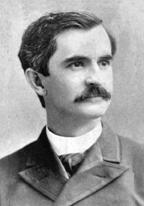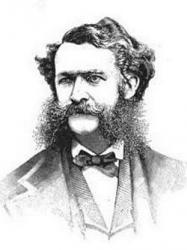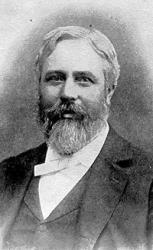
1854 - 1925 Hymnal Number: 13 Author of "The Sunward Side of the Cloud" in Choice Songs Amzi Clarence Dixon (July 6, 1854 – June 14, 1925) was a Baptist pastor, Bible expositor, and evangelist, popular during the late 19th and early 20th centuries. With R.A. Torrey he edited an influential series of essays, published as the The Fundamentals (1910-15), which gave fundamentalist Christianity its name. A. C. Dixon was the brother of minister, playwright, and influential racist Thomas Dixon.
Dixon was born on a plantation near Shelby, North Carolina, on July 6, 1854 to a Baptist preacher. While still young, Dixon believed he was called to preach the gospel.
In 1875, Dixon graduated from Wake Forest College in Wake Forest, North Carolina. He was ordained in 1876 and immediately began serving as pastor of two country churches. He also pastored in Chapel Hill and Asheville before attending Southern Baptist Theological Seminary (then in Greenville, South Carolina), where he was a student of John A. Broadus.
Thereafter, he filled the pulpits of Immanuel Church, Baltimore (1883-90), the Hanson Place Baptist Church in Brooklyn (1890-1900), the Ruggles Street Church, Boston (1901-06), the Moody Church, Chicago (1906-11), and the Metropolitan Tabernacle, London (1911-19). Because of the popularity of his speaking, he often rented the Brooklyn Opera House for Sunday afternoon evangelistic services. After leaving Brooklyn, he moved to Roxbury, Massachusetts, a suburb of Boston and became the pastor of Ruggles Street Baptist Church. While holding down the pulpit there, he also taught at the Gordon Bible and Missionary Training School, and turned his passion to writing, publishing Old and New, an attack on the liberal Social Gospel movement.
From Boston, he moved in 1906 to Chicago's Chicago Avenue Church, which had been founded by Dwight L. Moody. Two years after he arrived there, the church changed its name to the Moody Church, and he continued there until 1911. While at Moody Church, he also became a syndicated columnist, with his writings appearing in newspapers such as the Baltimore Sun, Boston Daily Herald and Chicago Daily News. He then crossed the Atlantic and ministered at London's Metropolitan Tabernacle, the church formerly pastored by Charles Spurgeon and other notable preachers, where he spent the war years. During this time, he often spoke at great Bible conferences. He preached there until his retirement in 1919. He was called out of retirement in 1922 and became the first pastor of University Baptist Church in Baltimore, Maryland.
The consistent theme throughout Dixon's career was a staunch advocacy for Fundamentalist Christianity during that movement's developmental period. His preaching was often fiery and direct, confronting various forms of apostasy. He spoke against a wide range of things, from Roman Catholicism to Henry Ward Beecher's liberalism, Robert Ingersoll's agnosticism, Christian Science, Unitarianism and higher criticism of the Bible.
Several months prior to Dr. Dixon's death, he suffered chronic back pain and suspended his service at University Baptist Church. He suffered a heart attack and died on June 14, 1925.
--en.wikipedia.org/wiki/
A. C. Dixon




